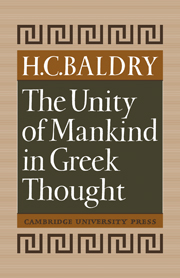III - SOCRATES AND THE FOURTH CENTURY
Published online by Cambridge University Press: 10 May 2010
Summary
SOCRATES
The ferment of ideas towards the close of the fifth century b.c. brought to the fore a number of conceptions relevant to our theme, which we shall find further developed and elaborated in later generations: the notion of a single universal and permanent ‘human nature’; the belief that certain physical attributes are common to all men; the concept of a human unity made up of diverse elements; the rejection of traditional divisions between men as artificial and relative, not natural or absolute; the picture of ‘civilised man’ as the human norm. We have seen that among an intellectual minority some of these trends of thought led towards an egalitarian outlook far removed from the traditional Greek point of view. If the ideas voiced by Protagoras, Antiphon and the medical writers had persisted and spread, they would have gone far towards undermining the accepted discriminations and prejudices which shaped the prevailing contemporary picture of mankind. This, however, is not the main development that we find in thinkers after the fifth century B.C. The actual sequel, very different from egalitarianism, owed its derivation principally to another line of thought—the attitude chiefly represented by Socrates.
At first glance Socrates might be regarded as having nothing to say that concerns us here. He avoided wide horizons, and notoriously confined his movements and activities to his beloved Athens. He wrote nothing that has survived, and we know of no pronouncement of his about mankind as a whole; yet he had a profound influence on Greek ideas about the unity and the division of the human race.
- Type
- Chapter
- Information
- The Unity of Mankind in Greek Thought , pp. 52 - 112Publisher: Cambridge University PressPrint publication year: 1965

